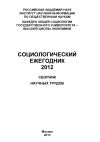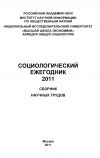Текст книги "Социологический ежегодник 2010"

Автор книги: Коллектив авторов
Жанр: Социология, Наука и Образование
сообщить о неприемлемом содержимом
Текущая страница: 38 (всего у книги 39 страниц)
Here is the way that I think of this: let’s say a giant company hires an expensive advertising firm and they design a huge advertising campaign to convince people of X, Y or Z – they do not necessarily succeed and convince. There are many studies of such failures. So we can’t assume that all the messages that come in are accepted. It depends on what other opportunities people do have to form opinions and on what is the role of informal communication. What about religion? Is religion a form of public opinion formation that has autonomy vis-а-vis the mass-media? What is the media’s relation of family structure or ethnicity? What region are you from? Does this affect your opinion of things apart from the media? There are many ways to sustain counter opinion that can be quite separated from mass media.
DP: You are talking about mass media as a means of creating civil definitions, but it can also become a tool of creating simulacra, in terms of Baudrillard, so this might be just another type of controlling the society, another way of making people believe something what those who control the mass media want them to believe. The question is, in other words, if civil sphere can be simulated? Is it a real threat, from your point of view?
JA: I like the way this question puts Baudrillard’s, post-modern, and Neo-Marxist critique of contemporary society in contact with my theory of the civil sphere.
Once you have a society where mass media is present, then performativity has a central place. None of us will ever meet personally and have a chance to evaluate in a face-to-face way those who are in power over us. 99.9% percent of us will never meet these people really – that is the fundamental condition of a large-scale modern and post-modern society. But that means that our understanding of who they are and their moral stature is a matter of projecting performance. When we evaluate performances we are always answering if they are fake or authentic, so a simulacrum is a judgment that the performance is fake. Baudrillard worked with the idea that there is an authentic reality which he knows as an analyst and a fake reality which he also knows, and that puts him close to Frankfurt critical theory. He sees mass media as culture industry and argues that in a post-modern society most of performances in the public are fake.
All public lives, all representations of power are matters of performativity and it is up to the public or what I call «citizen audience» to attribute authenticity and sincerity or to make a critical judgment that the performances are fake or not. In fact, the currency that circulates through a civil society, through its public spaces, is judgments as to «that is fake», «that is authentic», «he is moral», «he is pretending». Yes, other social conditions would make it more easy to pretend to be somebody whom you are not, and the answer would be if the mass media are controlled by a government or a corrupt capitalist class or businessmen people who are in league with the government, and if there is no competition between media and between political parties – that makes it harder for the public to reach an opinion about authenticity.
I wrote about this problem in a book that I have recently completed: The performance of politics: Obama’s victory and the democratic struggle for power (Oxford University Press, 2010). I said it would be technologically possible, for example, for the Obama or the McCain campaign to fake every single image, that they could pretend there were giant crowds when there were just a few people, they could pretend that people were applauding when they were not. There are immense technological possibilities. So the question is: why does not that happen in more or less competitive democracy? There is a chance to manipulate, so why don’t political candidates go all the way towards a real simulacra? I think it is because if you did that, you would be exposed in a day, or a week, or a month by the other side, by other media, and you would be exposed as violating the normative constraints of the discourse of civil society which demands honesty, responsibility, sincerity. You could be impeached, arrested or put in jail.
NP: How would you see the role of a sociologist in such conditions – whether a sociologist should demonstrate the authenticity of the process? Do you think the sociologist should be involved in analyzing the situation or a sociologist should be outside of those things? What would be a specific role of a sociologist in civil sphere?
JA: There are two different roles: there is a role of an intellectual and the role of a professional sociologist. Certainly, sometimes a person is both a public intellectual and an academic sociologist, but often not. Intellectuals can play different roles. One is very partisan – right-wing intellectuals, left-wing intellectuals. The role of such an intellectual is to speak not on behalf of the civil sphere but on behalf of particular interests. Yes, they are on the public stage, but they are people who formulate ideologies.
On the other hand, there is an intellectualist ideal, that goes back to Socrates, of people who speak on behalf of critical discourse of the civil sphere: Sakharov or Solzhenitsyn in the history of Russia, Habermas in Germany, Sartre and sometimes even Foucault in France. The key to this role is the word «disinterest»: «disinterested» means somebody who does not have a particular side and can step back therefore from a contest. I think that is the role of the academic intellectual as well. In a civil society an academic could enter a debate and say: «This is a fixed election, this is a simulacrum, this is not democracy», because the authority of a sociologist or an academic can be that we are speaking from a more universalistic point: «I am making a general remark about this entire situation, I am not for the left, I am not for the right, I represent myself from the point of view of the public».
NP: If I speak as an intellectual like Sakharov or Solzhenitsyn, but being a sociologist myself, I should first of all announce my role and status as an interested moral speaker, although I am a sociologist, but I am speaking on behalf of the society as a citizen. But in other case I should represent myself as a professional, disinterested, neutral value-free sociologist and say «I am speaking as a medical doctor to you, I am telling you your diagnosis». Is it true that you or myself or any other colleagues of ours should definitely represent themselves either as citizens or sociologists and not mix up those two roles?
JA: Those are ideal types, and in concrete reality we all mix those roles. An economist, a constitutional lawyer, a medical expert or an expert in public health might say: ‘I am an expert in this and I am telling you that the Russian economy has so much corruption’ (I am purely hypothetical here!). «The level of corruption is 55%, and if we don’t lower it to 20%, we will not have a productive economy» – that is a person speaking as an expert but obviously also as a citizen, because why would he care about corruption? Because he cares about solidarity, about obligations to others, about honesty – so we do mix these two roles together. But it is possibly different from saying «I am a member of a liberal party and therefore I want you to do this or that».
NP: Then definitely you are not an expert, but a representative of the political party.
JA: And a lot of intellectuals like to do that.
* * *
AB: To what extent does iconic experience affect modern society, what is the influence of it and whether it is a universal process which we may find in all the cultures and societies all over the world?
JA: For me, the critical issue is this: is iconic experience and iconic representation also present in a mechanical society, a modern society or it is only part of a religious society or a traditional society? For example, Russian orthodox churches are famous for icons, but undoubtedly the Soviet Union was filled with icons too?
As I said at the beginning of this seminar, I am very critical of the idea that there is a major break or epistemological difference between traditional and modern societies. Roland Barthes, in his collection of essays called «Mythologies», wrote a short and brilliant essay called «Einstein’s brain». To speak of the image of Einstein is to see the significance of iconic representation, because that image is a way of communicating a whole set of descriptive meanings about the modern world – the role of physics, the role of mathematics, the mystery of science, positive and negative possibilities. So for me, the iconic means that we represent cultural meanings not only through our discourse, in written and spoken languages, but also through the material culture meaning through the aesthetic constructions of the surfaces of things.
I don’t know any of you except Nikita (I had a pleasure of him coming into my house in New Haven). But I am looking at you and I see your faces, your hairstyles, how you are holding your hands, how you dress, and I am making – unconsciously largely – inductions about how you are thinking, feeling, who you are. I may probably be mistaken about 95% of the things I am thinking. But that is the role of surface, of representation, so my answer is that iconic experience is very important everywhere – that is why we have pictures of our beloved leaders on billboard.
NP: Jeffrey, why do you say you are 95% mistaken? Because you are from a different culture. When I look at my students, I am not 95% mistaken, because I belong to this culture and I have the power of interpretation and reading the iconic, right?
JA: Exactly. Of course, to the degree that your students and I are a part of the global culture where there is an international sense of style, then I have more security and can make more judgments better than 95%.
AB: You have already said that from your standpoint, iconic experience is truly important for different cultures in all historical periods. What is the role of emotions in iconic experience and, in general, in social and cultural systems?
JA: It is difficult for me to understand emotions without thinking of their symbolic representation. Say, ideas of pollution, fear of things stigmatized, feelings of shame or an embarrassment – emotions are attached to cultural codes, these social codes are patterned, they are institutionalized, and they are nor something that we possess as individuals. Why do we wear clothes instead of walking naked? It is a pretty significant thing and it is obviously about the coding of the emotions. Anger, joy, sadness – these are connected to narratives and brought forth by text – by progressive, tragic or melodramatic narratives. We should not study emotions in isolation from cultural sociology.
AB: You write that contact with iconic goes through our senses and transmits meaning, but at the same time that is a transmission without communicating. You also point out that iconical is about experience and to be iconically conscious is to be able to understand without knowing. How do you think, is reflection about why we worship icons or why somebody wants to be an icon, somehow kills or stops «iconic consciousness»? Schьtz wrote that at the very moment we start reflecting on dreams or fantasies, we are no longer dreaming or engaged in the sphere of fantasies.
JA: Reflection is not the same as iconic experience – it is an attempt to step outside of the flow of iconic experience, but being able to engage in reflection is itself partly stimulated by iconic attachments. For example, if you become attached to your sociology professor as an iconic figure and you learn to imitate him or her and you internalize his critical thinking in education – that iconic experience can allow you to be reflective and non-iconic vis-а-vis society. For example, in a radical social movement it is quite common to admire, even to worship a popular mass leader. This means there is iconic experience, so membership in the group is often a very unreflective set of emotions. But the members of that movement have critical reflection towards, let’s say, business or capitalist media.
I don’t think that there is a danger that reflection ends iconic experience forever: you can have reflections on dreams but you are still going to dream every night. You don’t stop yourself from dreaming, you wake up and you try like Freud did in the interpretation of dreams to gain some independence from the act of dreaming, but it does not mean you are not going to dream. You can think and write a book about love, but it does not mean you are not going to fall in love. And when you fall in love, you have lost your ability for reflection.
Аннотации статей и ключевые слова / Abstracts and keywords
Дж. Ритцер
Потребление по ту сторону кризиса
Анализируется роль потребления в нынешнем кризисе («Великой рецессии») и прогнозируется его судьба после кризиса, прежде всего в американском обществе. Констатируется зависимость американской экономики от потребления в его крайних формах (гиперпотребление, храмы потребления, долги). В свете этой зависимости предполагается, что данные формы потребления скорее всего сохранятся в американском обществе и после кризиса вместе с порождаемыми ими проблемами.
Ключевые слова: потребление, кризис, «Великая рецессия», американское общество
G. Ritzer
Consumption beyond the crisis
The author analyzes the role of consumption in the current crisis («the Great Recession») and predicts its prospects after the crisis, especially in American society. He states the dependence of American economy from consumption in its extreme forms (hyperconsumption, shrines of consumption, debts). In the light of this dependence it is supposed that these forms of consumption are likely to be retained in American society after the crisis together with problems generated by them.
Keywords: consumption, crisis, «the Great Recession», American society
В.Г. Федотова
Модернизация: Переосмысливая теорию и практику
Задачи реформирования Российского общества побуждают к содержательному переосмыслению понятия «модернизация». Предметом острой дискуссии в рамках современной теории общественного развития становится выбор модели модернизации на фоне столкновения концепций догоняющей модернизации (вестернизации) и множественной (опирающейся на локальную самобытность) модернизации. Процессы и трансформации в самих западных странах, успехи «перехода в современность» стран Юго-Восточной Азии (особенно показателен в этом смысле опыт Китая), глобальный экономический кризис делают все более актуальным вопрос об альтернативных сценариях общественного развития, о национальных моделях модернизации. В связи с этим социальные аналитики ставят под сомнение жесткую оппозицию категорий капитализм / социализм, глобальное / локальное, Запад / не-Запад. Адекватное обсуждение общественных перспектив возможно сегодня только на контектсуальной основе, на выявлении связи когнитивных социальных технологий и с внутренними инновационными целями (культурной спецификой общества), и с общим направлением мировых цивилизационных изменений.
Ключевые слова: модернизация, догоняющая модернизация, национальная модернизация, многообразие моделей развития
V.G. Fedotova
Modernization: Rethinking theory and practice
Aims of reforming Russian society prompt us to rethink the content of the notion «modernization». Against the background of the clash of the concepts of catch-up modernization (westernization) and multiple modernization models (to be based on local peculiarity) the choice of the modernization path has become an object of heated debate in contemporary theory of society development. Current processes and transformations in Western countries themselves, success in «transition to modern culture» demonstrated by South-Eastern Asian countries (particularly revealing is in this sense the Chinese experience), as well as the global economic crisis make still more relevant the issue of alternative scenarios of society development and national modernization models. In this connection society analysts call into question the rigid opposition of such categories as capitalism / socialism, global / local, West / non-West. Adequate discussion of society perspectives is only possible today on a contextual basis, with the link defined between cognitive social technologies and both inner innovation goals (the society’s cultural peculiarity) and the general trend of world civilization changes.
Keywords: modernization, catch-up modernization, national modernization, multiple development models
С.Н. Смирнов
Модернизация в атомизированном обществе
Основная задача модернизации в России состоит в том, чтобы консолидировать атомизированное общество по интересам и потребностям, прежде всего на уровне муниципий и создать противовес органам государственного управления. В конечном счете модернизация – это комфортная среда обитания для жителей страны, создаваемая и воспроизводимая на основе современных технологий и демократического управления, а не абстрактная национальная идея. Разумное самоограничение потребления может быть достигнуто только на основе доверия к государственным институтам, низкого в современной России. В этом контексте догоняющая модернизация представляется наиболее разумным для страны вариантом.
Ключевые слова: догоняющее развитие, местные сообщества, социально-экономические интересы, потребление, «замыкающие» группы населения
S.N. Smirnov
Modernization in an atomized society
The main aim of modernization in Russia consists in consolidating the atomized society according to interests and needs, first of all, at municipalty level, and in creating a counterbalance to state governing institutions. Ultimately, modernization means comfortable environment for the citizens, produced and reproduced on the basis of modern technologies and democratic governing, not an abstract national idea. Reasonable self-limitation of consumption can only be achieved on the grounds of confidence in state institutions, the level of that confidence being quite low in contemporary Russia. In the given context catch-up modernization seems the most rational variant for the country.
Keywords: catch-up development, local communities, socio-economic interests, consumption, «closing» population groups
О.Н. Яницкий
Модернизация России: Гуманитарные проблемы
В статье анализируются предпосылки, возможности и ограничения предстоящего этапа модернизации российского общества. Развивается идея перехода от техно-бюрократической к социально-гуманитарной ее модели, с опорой на союз науки и гражданского общества, и роль общественных наук в этом процессе.
Ключевые слова: модернизация и ее типы, коридор возможностей, ресурсы, гражданское общество, социология, Россия
O.N. Yanitsky
Modernization in Russia: Humanitarian issues
Prerequisites, possibilities and impediments of the forthcoming stage of modernization of Russia are analyzed with the focus on the shift from its techno-bureaucratic model to a socio-humanitarian one. This shift should be based on the alliance of the academic community and civil society which, in turn, means the necessity of growing involvement of humanities in the process.
Keywords: modernization and its types, opportunity corridor, resources, civil society, sociology, Russia
А.Б. Гофман
Социальное, социокультурное, культурное: Историко-социологические заметки о соотношении понятий «общество» и «культура»
Статья посвящена рассмотрению соотношения значения понятий «общество» и «культура» в истории социологической мысли. В ней наблюдается постепенное вытеснение, «захват» и замещение первого понятия последним. В связи с этим в социологической мысли XIX–XX вв. можно констатировать три «поворота», если использовать модный в последние годы термин: 1) к «обществу» («социальному»); 2) к «обществу-культуре» («социокультурному»); 3) к «культуре» («культурному»).
Ключевые слова: общество, культура, социальное, социокультурное, культурное
A.B. Gofman
The social – the sociocultural – the cultural: Historico-sociological notes on the correlation of the notions «society» and «culture»
The article considers the correlation of the meanings of the notions «society» and «culture» in the history of sociological thought. In the said thought one can observe gradual ousting, «seizure» and replacement of the former notion by the latter. In this connection in the sociological thought of the 19th – 20th century one can state three turns, if we use the now fashionable term: 1) to «society» («the social»); 2) to «society-culture» («the sociocultural»); 3) to «culture» («the cultural»).
Keywords: society, culture, the social, the sociocultural, the cultural
Правообладателям!
Это произведение, предположительно, находится в статусе 'public domain'. Если это не так и размещение материала нарушает чьи-либо права, то сообщите нам об этом.








































